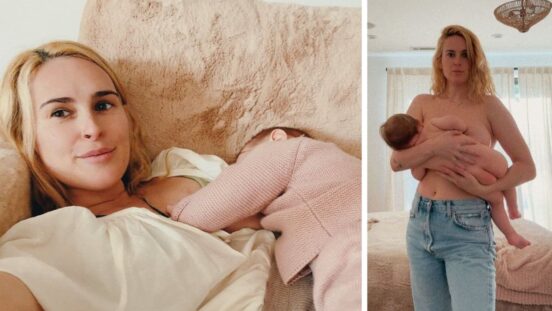Breastfeeding and coronavirus: Expert advice from a lactation consultant
Breastfeeding releases the “love hormone” oxytocin and we need some of that right now.
By Natasha Lunn, Lactation Consultant and Medela support partner
There is no doubt the impact of the coronavirus is a difficult time – with some breastfeeding mums and babies worried how they may be affected.
Breastfeeding can be challenging for many mums, even under normal circumstances as I personally faced.
As a lactation consultant and a member of the International Board-Certified Lactation Consultant (IBCLC) – I work with many mums every day sharing my advice, support and understanding – and I’ve spoken with many mums about their concerns during this time.
It’s why I wanted to share my story – my own challenges – and some practical information and tips to help other breastfeeding mums and their families stay healthy, well and embrace ways to stay positive and calm during the coronavirus pandemic. Now is no better time than ever to prioritise yourself first.
Why breastfeeding is so important for mums and babies – especially during stressful time, to support your physical and mental wellbeing
Breastmilk is a living fluid. It’s full of live cells and immune factors to help protect your baby from illness.
Research shows breastmilk plays an insignificant role in the spread of respiratory illnesses – and UNICEF reports the limited studies on breastfeeding women with COVID-19 and other coronavirus infections have not detected the virus in breast milk.

Breastfeeding helps with maternal anxiety and stress and is linked to lower incidences of PND.
Breastfeeding is also one of the most powerful ways to look after your mental health. It helps foster a secure attachment between you and your child.
Oxytocin, the “love hormone” released with breastfeeding, promotes positive feelings of love, attachment and maternal care with children.
When we’re experiencing heightened stress – which many of the world are feeling right now – we release a stress hormone known as cortisol – when we’re in fight or flight mode.
But thanks to oxytocin, breastfeeding mothers are found to have reduced cortisol in their bodies – and this decrease is also seen in the breastfeeding baby as well.
So, breastfeeding not only helps with maternal anxiety and stress in times like now, but also baby’s – and it’s also linked to lower incidences of PND.
And even if you are unwell, or affected by COVID-19, it’s still recommended you continue to breastfeed while taking necessary precautions not to transmit the infection – like washing hands, wearing a mask, cleaning/disinfecting and limiting exposure to other members of the family.
For more information about Coronavirus, you can visit Medela’s special COVID-19 information hub for mothers here.
How my own challenges with breastfeeding shaped the way I help mums today
But for those who are having troubles breastfeeding or your supply is affected – there are many useful strategies and tips available – as I needed during both my breastfeeding experiences.
As a little girl, I pictured myself as the Madonna with baby at her breast. I was going to be that kind of mother – breastfeeding publicly, a wistful look in my eye, relaxed, serene, in love.
But life had different plans. My first baby boy, born nearly 10 years ago, was severely tongue tied.
I remember the IBCLC in the hospital saying to me, “you will never get him to latch with a tongue like that.”
We promptly turned to a dummy to ‘calm’ my starving baby, within five months, my first physically and emotionally exhausting breastfeeding journey ended.
Looking back, I wish I knew what I do now. What a difference a breast pump, nipple shields, support and information would have made.
It was this difficult experience which prompted me to become a breastfeeding counsellor and later an IBCLC – ensuring other mums didn’t go through what I had to.
Another two years later and my daughter was born. By this time, I had joined the Australian Breastfeeding Association (ABA) and had more knowledge and a support network of counsellor friends, but I still faced a tough start to my second breastfeeding experience.
My daughter was born late preterm – a tiny 2.5kg. I was exhausted from four weeks in hospital and I could barely stay awake to finish a sentence, let alone an hour on the couch breastfeeding.
She was slow to gain weight – and bonding was difficult.
I was also anxious about returning to work to manage financial pressures – and worried about being unable to pump because of my first ‘failed’ experience with my son – but I also didn’t want to top up with formula.
I was heading towards a rapid spiral of postnatal depression (PND).
But it was eventually a long bath with my baby that was the turning point to getting our breastfeeding back on track. The benefits of skin-to-skin care, in a ‘no pressure’ environment, where we could relax and aid with the release of oxytocin, encouraging both the let-down reflex and my daughter’s innate reflexes to root her way to my breast and latch on.
became the natural and nourishing experience I loved and longed for – for three and a half years.
So how can breastfeeding mums stay physically and emotionally well during this time? Some helpful tips
I was also eventually able to master the art of breast pumping the second time around, thanks to regular mindfulness practice, breathing and establishing a routine for pumping that my body eventually understood what I was asking it to do.
So, between breastfeeding, using my Medela breast pump, and the support of my caregivers, we conquered tongue ties, allergies, child custody arrangements and many sleepless nights along the way – and breastfeeding and expressing eventually
Now more than ever it’s a time for breastfeeding mums to prioritise your wellbeing – like putting on your lifejacket first. And here are some tips to help you do this:
Get out and go for a walk.
Endorphins from exercise will help with stress as well as a good dose of Vitamin D from the sun. Just remember, in these times of COVID-19, to keep a 1.5m distance if you run into someone outside of your family unit.
Do something you love!
Whether it is cooking, crafting, exercising, gaming, painting, dancing, enjoy an activity that fills your cup, makes you feel good about you!
Keep your babe close by wearing them in a sling, wrap or carrier to help promote those feel good oxytocin vibes as well.
Since we are all home together, have some lovin’ with your partner.
Sometimes it doesn’t matter where the oxytocin boost is coming from (sex is a great oxytocin release).
When it comes to breastfeeding and pumping, create a ritual to help with the letdown response
The letdown is a conditioned response – we react to a set of stimuli like being around our baby and nipple stimulation to make it happen.
But introducing other stimuli that’s the same every time can also be helpful – like having your favourite drink, sitting in the same spot, binge watching a series on Netflix, having your snacks close by (I recommend having snack stations set up everywhere you breastfeed by the couch, next to your bed etc).
Take a bath with your baby.
Go in with zero expectation to breastfeed. Just relax and enjoy the warmth and skin-to-skin time. If they latch, even better!
Get expert help and support tools if you have supply or painful challenges
If you experience a drop in milk supply or you’re experiencing pain, it’s important you talk to a health professional – like your GP or IBCLC or contact the Australian Breastfeeding Association’s Breastfeeding Helpline. Many health professionals are doing telehealth consultations in line with the new COVID19 restrictions.
Some ways you can increase your supply include feeding or expressing frequently (at least eight times in 24 hours, preferably more often). A pumping bra and double pump can be very helpful – like Medela’s new personalised Flex™ technology breast pumps.
You can also try ‘hands-on’ breastfeeding (massaging your breast while feeding or pumping) to increase milk output.
Nourish yourself
Make sure you’re are eating well, staying well hydrated, and getting lots of rest when you can
Stay connected – virtually
While we may be forced to isolate, make sure you stay connected to your friends and family via phone and video conferencing. There are also many mums’ communities and information online, like Medela’s Mums Room.
If you are feeling particularly anxious or depressed, support is there
If you’re feeling overwhelmed, stressed or anxious right now, there is professional support available – including the via the free PANDA National Helpline, 1300 726 306. PANDA (The Perinatal Anxiety & Depression Australia) helps women and their families who are suffering from perinatal anxiety or depression.
But most importantly, it helps to remind yourself COVID19 will pass, as will the emotional challenges of newborn life, and we’ll come out of this stronger than ever.
For more information on Medela Australia click here.
Nastasha Lunn is an International Board Certified Lactation Consultant (IBCLC) who helps mums breastfeed in a way that works well for them and for their baby. She is the author of a number one Amazon bestseller “Boobalicious: From Hot Mess to Breastfeeding Success”, has a Masters in Osteopathy and is a mum of two children.




